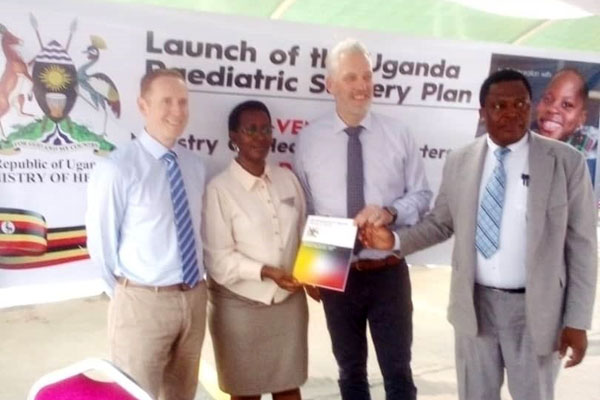Prime
Ministry of health, UK charity in drive to construct children theatres

From L-R: David Cunningham CEO Kids OR , Daina Atwine , PS Ministry of health and Garreth Wood co-founder Kids OR.
What you need to know:
- In January this year, the two institutions pooled resources that saw 48 children receive surgery that they could otherwise, not have received under normal circumstances.
In an effort that would potentially revolutionise paediatrics in Uganda, the Ministry of Health in partnership with Kids Operating Room (Kids OR), a global health charity, has released the first ever children surgery national plan.
Launched on Thursday by the health officials led by the ministry’s Permanent Secretary Diana Atwine , the Kids OR officials led by Garreth Wood who’s the team chairman and David Cunningham, the chef executive officer, the five-year strategy aims at scaling up paediatric surgical services to regional referral and general hospitals as well as training of paediatric surgical workforce.
Uganda currently has only eight paediatric surgeons based at Mulago National Referral Hospital and Mbarara Regional Referral Hospital, with inadequate workforce and infrastructure in other regional referral hospitals to conduct surgery for children effectively.
According to Dr Atwine a child in Uganda has an 85 percent risk of requiring surgical care by age of 15.
“A third of the patients in our surgery wards are children and an estimated one million children have an unmet surgical need. This unmet need for paediatric surgery is due to shortages in human resource (only seven paediatric surgeons), inadequate surgical equipment and infrastructure, poor health seeking behavior for surgical conditions by the population, among others,” she said.
It’s against this background that Dr Atwine revealed that her ministry has put significant focus on expanding access to services for paediatric surgery and developing tertiary units to manage complicated cases.
“This includes the establishment of the Entebbe Children’s Hospital, renovation and equipment of operating theatres across referral and district hospitals, establishment of the ICUs across all regional referral hospitals, training of more general surgeons and support staff, among other initiatives,” she said.
Reinforcing Dr Atwine’s statement, the director clinical services, Dr Charles Olaro, noted that it’s possible to build comprehensive surgical services for every child in the country.
“The plan is to have a well-established network of hospitals across the country as well as adequate local expertise…From the taskforce convened, recommendation is to develop a Super Hub (Mulago National Referral Hospital,) Hubs and Spoke model whereby at least 21 paediatric surgeons and their associated teams will be trained and employed by the end of 2027,” he said.
According to the charity organisation, the Super Hub- Hubs- Spoke model will ensure that there is sharing of resources, continuous mentorship and better communication through referral networks with lower healthcare level facilities.
In the model, a Super Hub is equipped with better resources to provide specialised and super specialised care. A Hub has all the required resources to provide general paediatric surgery while receiving support from the Super Hub with the option to refer patients needing more advanced to the Super Hub hospital. Hub hospitals will in-turn support the Spoke hospitals - those district/general hospitals who do not have qualified paediatric surgical teams but who do provide surgical care for children.
During the function, Mr Wood said: “We are privileged to be part of this first ever paediatric surgery roadmap in Uganda. This will help more children get the right care, at the right time and in the right place, something we should all be extremely proud of. If fully implemented, it will save thousands of lives in the years to come.”
Research done by the organisation shows that perceived barriers to accessing paediatric surgery have been reported as geographical such as transportation barriers, discrimination, caregiver limitations to support recovery, awareness of surgically-treatable conditions and financial barrier.
“Studies focusing on the reasoning for delayed seeking of surgical attention found that stigma, fear of surgery and anaesthesia, family power dynamics, misdiagnosis and lack of knowledge and mistrust of the healthcare system were all key factors. Some families also sought care from traditional methods before seeking hospital care for their child’s surgical condition,” the study shows.
“Social and financial barriers have been shown to contribute heavily to accessibility of, and care-seeking behaviour’s for, paediatric surgery. In a survey of Ugandan community members and parents of children with congenital anomalies in 2021, 100 per cent believed that seeking surgical care would lead to poverty.”





